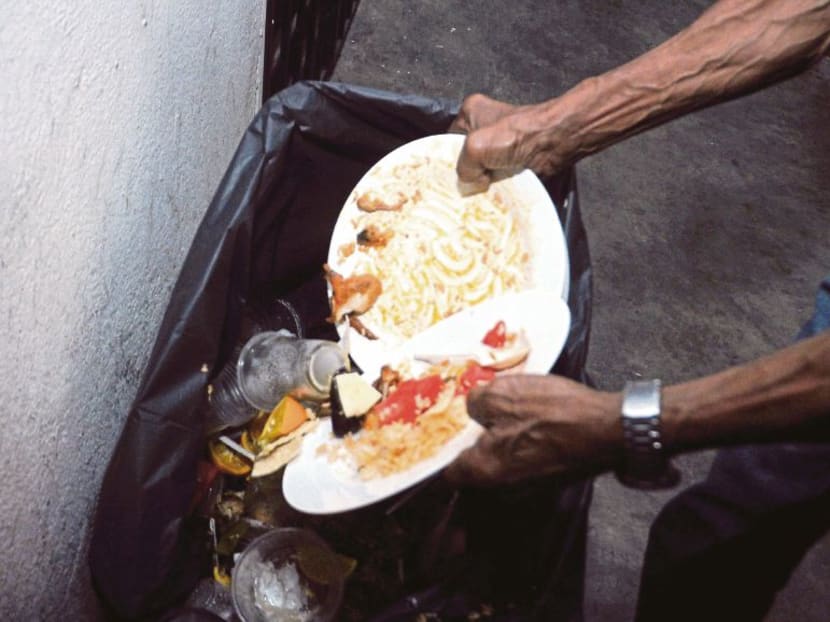More than half of food thrown away by households can be avoided: NEA study
SINGAPORE — More than half of food waste generated by Singapore households would not have been trashed if they were better managed, such as by buying and cooking the right proportions, a waste audit has found.

Food services like restaurants, canteens and hotels were responsible for 28 per cent of all wasted food in 2022, while retail like butchers and greengrocers dumped 12 per cent.
SINGAPORE — More than half of food waste generated by Singapore households would not have been trashed if they were better managed, such as by buying and cooking the right proportions, a waste audit has found.
This amount of "avoidable" food waste generated by each household amounts to chucking a 2.5kg bag of rice each week, according to the National Environment Agency (NEA).
Sharing these findings at a community health event for ladies at Hong Kah North Community Club on Sunday (Dec 3), Senior Minister of State for Environment and Water Resources Amy Khor urged Singaporeans to avoid wasting food during the upcoming festive season by not succumbing to "impulse buys". She suggested saving leftovers for other dishes and ordering only what one can consume while eating out.
"It is a period when we tend to over indulge... This festive season, I hope everyone will adopt healthier eating habits and eat in moderation by ordering or cooking only what you need," she said.
"This will not only allow us to keep healthy but also avoid food waste and reduce expenses. At the same time, we will be doing our bit for the environment."
The NEA study on household waste showed that 54 per cent of food waste generated by households would not have been binned if people adopted a more prudent approach towards managing their food.
Twenty seven per cent of households interviewed in the study - which polled 443 families from November 2016 to March this year - said they had leftovers at least half the time.
In addition, about one in four (24 per cent) said they often threw away spoilt and expired food as a result of buying too much, or due to having food items hidden at the back of the fridge.
"Personally, I must confess that it happens to me, when I go to a supermarket... So I think it is important to raise awareness among consumers, give them tips, on how to manage food waste," said Dr Khor.
The amount of food waste generated in Singapore has increased by about 40 per cent over the last 10 years. Last year, the city state generated 791,000 tonnes of food waste - equivalent to the weight of over 3,500 MRT trains, noted the NEA.
As part of the audit, waste was collected from 279 household over three days and sorted to determine the amount of "avoidable" and "unavoidable" food waste, including parts of food not intended for consumption, like bones and egg shells, that each households throws away.
Food waste accounts for about half the waste disposed by each Singapore household daily. Staples like rice, noodles and bread are the most commonly discarded food items.
Dr Khor said that as society becomes more affluent, food choices have also increased. "People start consuming more, and that can become a habit," she said.
"Sometimes, culture (plays a part too). For instance, during festive seasons like Chinese New Year, they always say... We must always have some (food) left over."
Half of the households interviewed acknowledged, on hindsight, that they could have done more to avoid food waste in the form of leftovers, expired or spoilt food, and blemished fruits and vegetables.
Fifty four per cent of the households surveyed also said that retailers and manufacturers can help to reduce food wastage, such as by packing food in smaller portions.
The authorities will look at working with business like supermarkets and food retail outlets to reduce food waste, said Dr Khor.
On Sunday, she also announced the second National Falls Prevention Awareness Campaign, which will focus on preventing falls at home for the elderly.
Six in 10 falls among seniors occur at home, according to figures from the National Trauma Registry.
As such, this year's campaign centres on encouraging households to keep their floors clutter-free, use non-slip mats and install grab-bars to provide extra support.
"Falls are a common cause of injury and can have serious implications on health and quality of life... Together, we can make our homes safe for ourselves and our loved ones," said Dr Khor.









